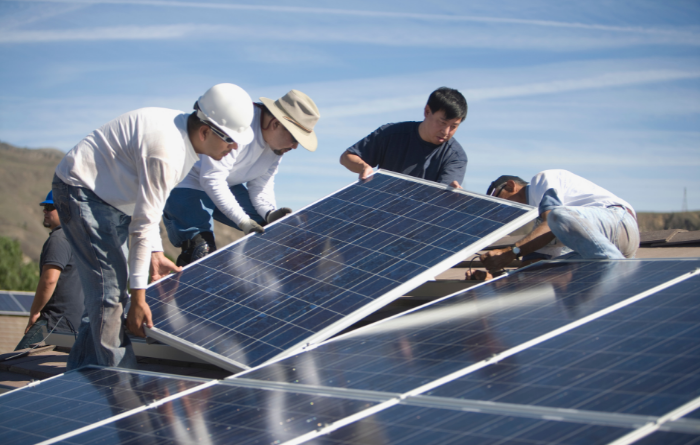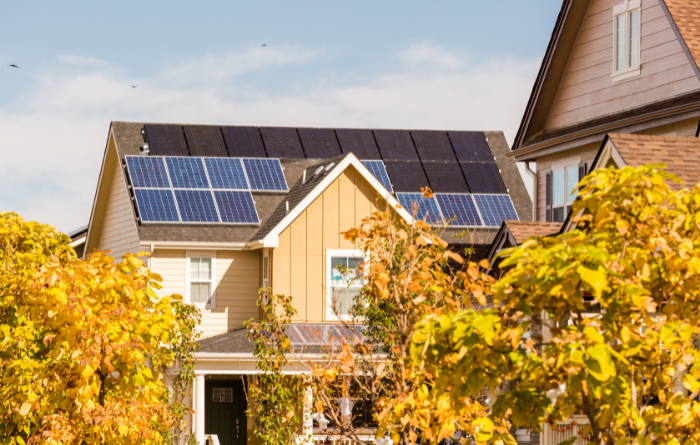How long do solar panels last? This is a question many people ask before making the decision to buy solar panels for their homes. In the UK, the average lifespan of a solar panel is around 25-30 years and during that time, not only will they help reduce your carbon footprint, but you could also save significant amounts of money on your energy bills.
In this article, we’ll take a closer look at solar panel life expectancy and what affects it. We’ll also explore the benefits of solar panels in more detail, and show how you can apply for government solar grants to help pay for them.
Solar Panel Life Expectancy
Solar panels are made up of photovoltaic cells, which convert sunlight into electricity. These cells are usually made from silicon, and they degrade over time due to exposure to the elements. The average solar panel will lose around 0.50% of its power each year for the first 25 years. This means that a solar panel with an output of 250 watts will have an output of around 225 watts after 25 years.
This is not much of a drop-off but it’s worth bearing in mind when planning your solar panel system. The reality is that many modern solar panels systems will likely operate to a high level well beyond the 25-year mark with some manufacturers claiming their systems will last for 40 years or more.
What Affects the Life Expectancy of Solar Panels?
While the average solar panel will lose around 0.50% of its power each year, this number can vary depending on the type of solar panel and how well it is made. For example, monocrystalline silicon solar panels tend to last slightly longer than polycrystalline silicon solar panels.
The quality of the solar panel system is also important. If you buy a cheap system, it may not last as long as a more expensive one. This is because cheaper systems are often made with lower-quality materials.
Solar panel lifespan is also affected by installation because if the panels are not installed correctly, they may not last as long as they should. All UK installers must be MCS accredited so that you can be sure they are properly trained and qualified.
It’s also important to have your system regularly serviced and maintained. This will help to ensure that it is running as efficiently as possible and that any problems are caught early. You will also need to clean your panels regularly to remove dirt and debris but this is easily done with a hosepipe.

The Benefits of Solar Panels
There are many benefits to using solar panels, including:
Cheaper Electricity
Solar panels can help to reduce your electricity bills because you will be generating your own power. The amount of money you can save on your energy bills depends on the size of your solar panel system and how much electricity you use but a typical household in the UK could save around £500 a year by installing solar panels. This is a significant amount of money, especially when you consider that the average energy bill in the UK is capped at around £2,500 until March 2023, and expected to increase for many after that.
Greener Energy
Solar panels are a renewable source of energy, which means they generate power without causing pollution. This is good for the environment and helps to reduce your carbon footprint. The UK government is aiming to reach net-zero carbon emissions by 2050 and solar panels will play a big part in achieving this.
Energy Self-Reliance
Solar panels allow you to generate your own power, which means you are not reliant on the national grid. This is especially important during times of high demand when the grid can become overloaded. It also means you are less likely to be affected by power cuts.
The Opportunity to Make Money
If you generate more electricity than you need, you can actually sell that excess back to the grid. This is called the Smart Export Guarantee and it is available to all householders in the UK. The amount you are paid for your electricity will vary depending on the tariff rate, but it is a great way to make some extra money.
How Much Do Solar Panels Cost in the UK?
Solar panels are not cheap but they are becoming more affordable as technology improves and prices fall. The cost of solar panels will vary depending on the size and type of system you need but the average cost of a solar panel system in the UK is around £8000. This includes the cost of the panels, inverter, and installation. Maintenance is relatively cheap and should only cost you around £100 per year.
In addition to these costs, you may also need to pay for batteries that will store the electricity you produce for later use. This can be particularly important in the UK because the weather is not always sunny. Batteries are usually priced separately from the solar panels themselves and you can expect to pay around £2,000 for a good quality battery.
How Can You Get Help with These Costs?
The UK government is keen for people to make the move to more renewable sources of energy but is well aware that the high upfront costs price it out of many people’s budgets. This is why there are various schemes in place to help people afford the purchase and installation of solar panels and solar batteries.
The main grant available to you is through the ECO4 (Energy Company Obligation) scheme. This is a government-funded scheme that was introduced in 2013 to help low-income households make energy efficiency improvements. The scheme pays for some or all of the costs of installing solar panels and solar batteries, as well as other energy efficiency measures such as insulation and double glazing.
The money is 100% non-repayable so you don’t need to worry about having to pay it back. You can claim multiple times for different home improvements so, for example, if you’ve already had a heat pump installed, you could still claim for solar panels.

How does the ECO Scheme Work?
In order to be eligible for the ECO scheme, there are a few things you need to take into account. Firstly, your household income must be less than £30,000 per year before tax. If you’re on certain benefits, you may also be eligible. These include:
- Income Support
- Jobseeker’s Allowance
- Employment and Support Allowance
- Pension Credit Guarantee Credit
You will also need to have an Energy Performance Certificate (EPC) for your property that is less than 12 months old. The EPC rating will need to be in band C or below.
The maximum amount of money you can get through the solar panel scheme is £10,000 which could go an enormous way to offsetting the cost of your solar panel installation.
What Else Do You Need to Know?
Firstly, you need to make sure your property is suitable for solar panels. This means it needs to have a south-facing roof that is not shaded by trees or other buildings. If your property doesn’t meet these criteria, you may still be able to install solar panels but they will be less effective.
You should also bear in mind that solar panels will likely increase the value of your property as they are a big selling point for many buyers and can add thousands of pounds to the value of your home.
What Else is Available through ECO?
As well as solar panels, the ECO scheme can also help you to pay for other energy efficiency measures such as replacing your gas boiler with a ground source or air source heat pump and installing insulation. All of this assistance is designed to make it easier for you to make your home more energy-efficient and reduce your carbon footprint.

Final Thoughts
As you can see, the answer to the question “How long do solar panels last?” is a long, long time. However, the more important question is “Are they worth it?” While solar panels can be expensive to purchase and install, the money you will save and the positive impact you can have on the environment make them well worth the investment. And with the help of schemes like ECO, solar panel systems have become very affordable for the vast majority of households across the UK. To find out more about the scheme and whether you qualify, enter your postcode here.
